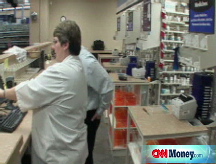Musician gets high court OK to sue Wyeth
U.S. Supreme Court says Vermont woman who lost an arm has the right to sue over inadequate product labeling.
WASHINGTON (CNN) -- A Vermont musician who lost an arm to gangrene after being given a common prescription medication won the right to collect nearly $7 million when the Supreme Court ruled in her favor Wednesday.
The company that made the drug - pharmaceutical giant Wyeth (WYE, Fortune 500) - had been found guilty of inadequate product labeling.
The 6-3 ruling that Diana Winn Levine had the right to sue the drug company was a victory for patients and consumer groups that sought to hold the pharmaceutical industry accountable on drug safety.
"I am as happy as a clam right now!" Levine told CNN. "It was hanging over me, and I just am so glad it's resolved, and resolved in a way that speaks well for our government and our justice system."
At issue was whether the Food and Drug Administration's approval of prescription drugs would "pre-empt" - or prevent - individuals from suing drug makers.
Levine was administered the anti-nausea drug during treatment for a severe migraine and wound up having her arm amputated below the elbow.
She filed suit in state court, and Wyeth was ordered to pay $6.7 million for failing to place adequate warnings the drug's label. The drug infected Levine's artery, leading to the amputation of her right arm, which she says derailed her music career.
"It is not impossible for Wyeth to comply with (both) its state and federal law obligations and ... Levine's common-law claims do not stand as an obstacle" to federal oversight of drug safety, wrote Justice John Paul Stevens for the majority.
The ruling could emerge as one of the biggest business cases the high court has addressed in recent years. The stakes are enormous, pitting business interests against consumer advocates and trial lawyers.
Individuals could be further encouraged to bring lawsuits in state courts against makers of a wide range of products - from seat belts to cigarettes.
Companies have asserted various doctrines of pre-emption, saying they are protected from most product-liability claims if they have met federal safety approval standards. They argue that federal regulatory judgments trump state consumer safety laws, which are often tougher than Washington's standards.
"I just felt so insecure because there were so many things in everyday life that were suddenly difficult," Levine told CNN in her rural home in Marshfield, Vermont, which doubles as a recording studio. "So, instead of contending with my wonderful music business, I was contending with how to button my shirt."
Levine, 63, is co-founder and head of ReBop Records, a small independent label of mostly children's tunes. She also performed locally in bands as bass guitarist.
That ended in April 2000, when a friend drove Levine to a health clinic near her home. As had occurred on previous occasions, Levine was given promethazine (Phenergan) to treat her migraine.
In those previous cases, the drug had been injected into her muscle, but this time it was delivered via an infusion device called an IV-push. It delivered a faster-acting, higher volume of the medication to her wrist, through plastic tubing attached to a curved needle.
The needle was supposed to be inserted directly into a vein, but somehow an artery became infected.
"That was the beginning of the end," said Levine.
Soon after she left the clinic, "the arm felt all wrong. It hurt, and when I looked down it seemed swollen." As tissue died, her hand and wrist turned black and, six weeks later, doctors amputated.
Vermont's highest court eventually affirmed a lower court's $6.7 million judgment against Wyeth. "We hold that the jury's verdict against defendant did not conflict with the FDA's labeling requirements for Phenergan," that court concluded, "because defendant could have warned against IV-push administration without prior FDA approval."
The company noted the drug was approved in 1955 and has been used by 200 million patients. Company lawyers told the high court there were instances where the IV-push method is "medically warranted."
"We believed that federal law prohibited the company from revising its product label as the Vermont court required, and we regret that the Supreme Court disagreed," said Bert Rein, who argued the case before the justices for Wyeth. "The medical and scientific experts at FDA are in the best position to weigh the risks and benefits of a medicine and to assess how those risks and benefits should be described in the product's label."
The Bush administration had supported the drugmaker, and government lawyers told the justices the FDA conducts a thorough safety review before granting approval. That gives pharmaceutical companies the go-ahead to manufacture and market their products, free from concern about liability lawsuits in state court, they argued.
Wyeth officials said they believed they were prohibited from changing the label without FDA approval, a notion Levine's lawyers rejected.
Wyeth no longer manufactures Phenergan.
The high court has recently begun a push to address broader pre-emption conflicts, accepting cases ranging from medical devices to cigarette advertising.
The case heard this week is Wyeth v. Levine (06-1249). ![]()



